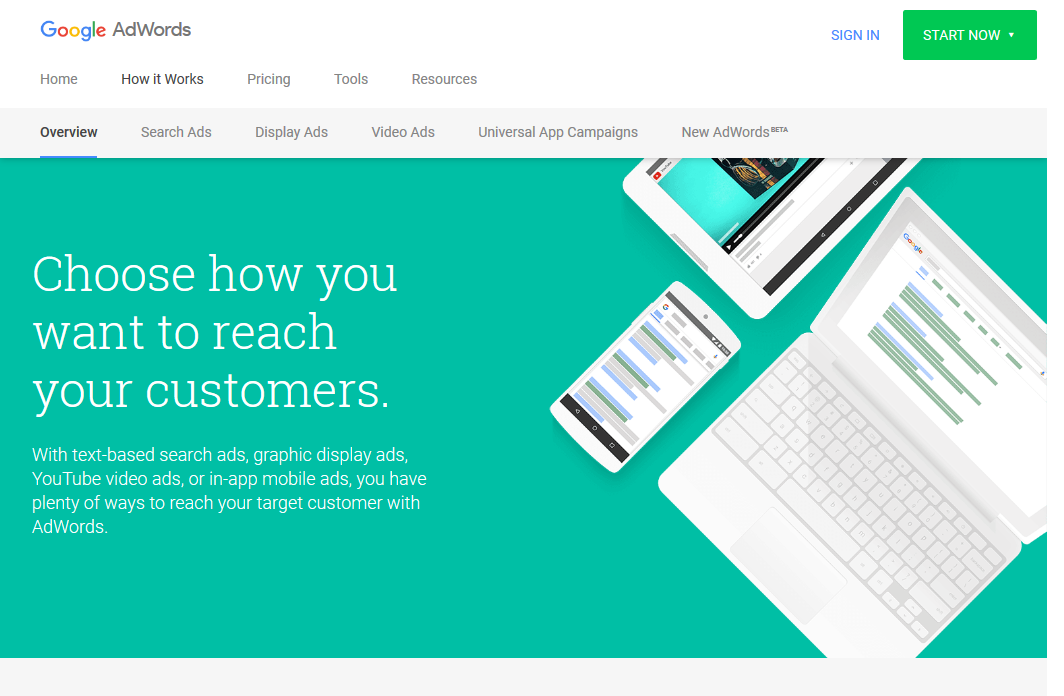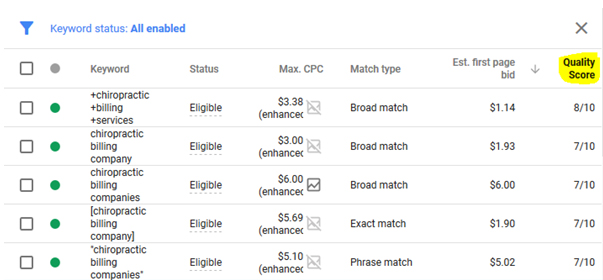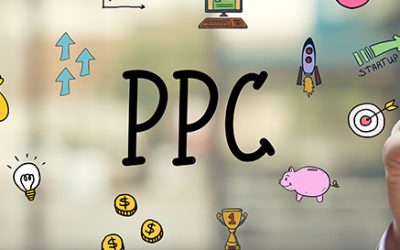Digital marketing for healthcare has become more complex with medical advertising continuing to evolve. Today, the vast majority of people are using the Internet to get information about healthcare and this is the reason why medical practices, hospitals, medical businesses etc have embraced digital marketing as a means to reach and communicate with their target audience. Businesses must clearly understand their business requirements, marketing objectives and their target audience. Once all these factors are clear, it is easier to attract potential patients or healthcare consumers to your website. To improve ranking and traffic, websites should be search engine optimized and optimizing keywords is one of the most important aspects of organic SEO as well as PPC campaigns. Keyword optimization is a crucial step in digital marketing from content marketing to link building, to PPC campaign management.
What Is a PPC Campaign?
PPC campaigns provide an opportunity for businesses to buy instant and relevant traffic. It helps businesses target specific users who interact with Google’s search interface. Google AdWords is an online advertising service that allows you to bid on certain keywords in order for your clickable ads to appear in Google’s search results. You have to pay for these clicks, and therefore before you move forward with Google AdWords, make sure to spend some time to understand how it works. Proper planning, timing and execution are very important.
Choosing the Right PPC Keywords
Keywords are important because these are the terms you target in search campaigns; displaying ads for keywords can generate clicks that will ultimately generate new customers. Since there are numerous new searches on search engines, advertisers must target keyword variations as well. The keywords and key phrases you choose should be highly specific and relevant to your business. Google appreciates relevance and rewards you. Your keywords should connect directly with your ad copy and website copy. When a user types your keywords into Google, they should be looking for a business just like yours. Consequently, people who click on your ad will already be inclined to buy from you.
Using PPC keyword tool is a great way to prepare a list of PPC keywords for ad campaigns. It helps to quickly find hundreds of keywords that real people are using with additional important data such as search volumes, competition level, and estimated PPC cost for each keyword. Word Stream’s Free Keyword Tool helps to get a list of PPC keywords; and to get more actionable and personalized results you can specify your industry and country. Another option is to connect with your AdWords account to get personalized cost and competition data based on real PPC metrics.
A proper PPC campaign includes different types of keywords with various levels of intent such as the following:
- Commercial keywords: These are the most valuable keywords in PPC and are high intent terms that are generally used by prospects that are likely to buy a product.
- Brand Keywords: These include the brand name and tend to have very low cost and very high quality and yield excellent results in terms of conversion rate and click-through rate (CTR).
- Broader, low intent keywords: To expand your reach, it is important to invest in broader PPC keywords that have low intent. This helps to increase brand awareness. You can increase your conversion rate on broad keywords through remarketing strategies.
- Competitive keywords: Competitive keywords allow to get your brand and offerings in front of people who are searching for your competitors’ products and services.
- Long-tail keywords: Long-tail keywords are longer, highly specific terms that are low cost and have less keyword competition.
Tips for Planning Your Campaign
- Keyword research: The first step is to start brainstorming and prepare a list of keywords you think are relevant. Choose keywords that describe what you do and how you do. Run your keyword list into the AdWords Keyword Planner and you will get an expanded list of keywords along with data about how often people search and how many competitors are also targeting those keywords. Carefully review the expanded list and eliminate irrelevant keywords.
- Keyword pruning: Using the keyword tool, you should be able to prune back certain keywords phrases that are irrelevant or are generating clicks, but not conversions. This report gives you the exact keyword phrase that was searched when your ad was displayed. You can sort by clicks to view the list of keyword phrases that have a history of clicks but no conversions.
- Develop ad text specific to keywords within an ad group: Each ad group must have at least one ad text that specifies the topic of that ad group. This helps to improve Ad Quality Score – a metrics measured by Google. It will allow the searchers to connect the ad to their search phrase easily. If the ads and landing pages are more relevant to the user, then you are more likely to achieve higher quality scores. High quality score can give you better ad positions at lower costs.
- Link ads to landing pages that cover the same topic as the keyword in ad group: Sending the people who click on your ads to pages that cover a similar topic as the keywords within each group will help the Quality Score. As ads become more specific, it will be tempting to link ads to the pages you already have. The less related your ads are to your landing pages, the less likely visitors are to convert.
- Use Exact match targeting: Exact match targeting means your ads will appear only when someone searches for the exact same keyword that you have targeted. This strategy is very helpful for small businesses that are new to AdWords. This is because it gives them better control over their ads and prevents them from wasting money on unnecessary phrases. Once you have all data about how the keywords perform, there might be instances where using a broader match setting will be useful.
- Use location targeting: If you provide services within a confined geographic area, ensure that your campaigns are set to display ads only to searchers within that area, or else you will end up paying for clicks that are from people in locations where you cannot provide services.
- Strike a balance between search volume and competition: Focus on PPC keywords with the least amount of competition. Finding keywords with a high search volume is also beneficial because it indicates that you are reaching a larger audience when you rank for them. There is typically an inverse relationship between these two variables. It is more difficult to bid on the keywords with the biggest search volume for your company because they are typically more competitive. Most of the time, these terms are shorter. You typically face less competition when using longer keywords. As the queries are more focused, they don’t produce as much traffic. Finding keywords that achieve a good balance between the two is therefore necessary. Identify keywords that not only attract high traffic but are also sufficiently specialized to drive genuine, targeted visitors.
- Add synonyms and variations: It’s time to begin expanding your keyword list after you have a strong base. Using synonyms and variations of the keywords you already target is one of the finest ways to expand your keyword list. Let’s take the example of focusing on “photography services.” Not every person looking for photographic services will see this keyword. Some people will use variations of the term, such as “professional photographer” or “portrait services. You can utilize tools like KeywordsFX to discover comparable keywords, while also brainstorming synonyms on your own. Additionally, consider the related keywords suggested by Google at the bottom of each search results page.
- Make intent-based ad groups: Researching PPC keywords is more than just coming up with a random list of targeted keywords These keywords need to be effectively arranged into ad groups, which are collections of related keywords and the advertisements that will target them. For instance, suppose you wish to advertise your newest suitcase using PPC. To target consumers who are considering purchasing a new luggage, you compile a list of ten keywords and produce three advertisements. This is known as an ad group. Your list of keywords can be targeted by each of those advertisements. Search intent is used to bundle your keywords and adverts together.
- Be aware of negative keywords: Knowing which keywords you don’t want to target is just as crucial as determining which PPC keywords you want to target. You can generate lists of negative keywords—that is, terms unrelated to the content of your ad—in Google Ads. For example, you may target many keywords that contain the term “shade” if you’re attempting to market your shade solutions. However, you shouldn’t target a keyword like “lamp shade,” as that’s not what you sell.
Mediocre digital marketers fail to structure their online campaigns effectively. It is a known fact that only a streamlined and well-thought-out strategy can provide a good result. A successful healthcare PPC campaign requires thorough planning, keyword research, and continuous optimization. Keywords are the backbone of PPC advertising, so selecting the right keywords is important. A reliable healthcare digital marketing services can offer the required support to choose target keywords for your PPC or AdWords campaign after analyzing your medical business as well as your competition. They provide strategic PPC advertising services that could ensure a great standing for your website in search indexes on Google, Bing and other leading search engines. Finding the right outsourcing partner plays an important role in determining your digital marketing success.






